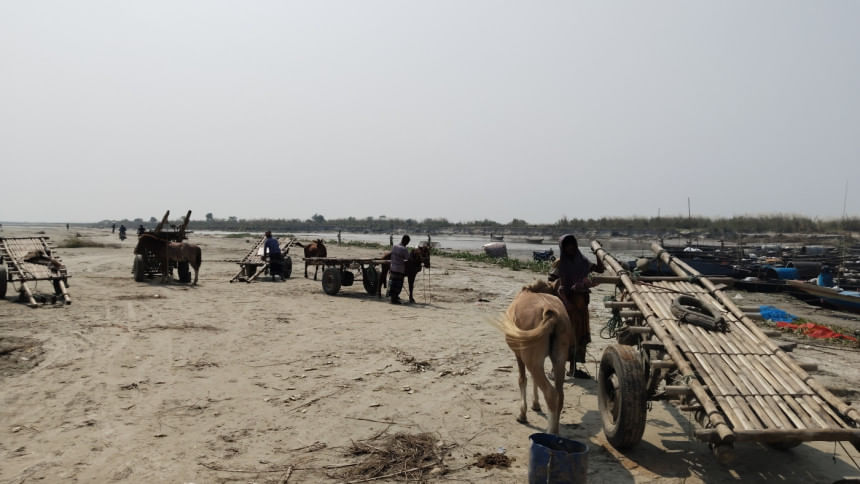Horse carts, motorbikes keep life and economy moving in Padma chars

In the char areas along the Padma river, horse carts remain the primary mode for transporting goods and motorbikes serve as the only reliable means of travel for residents, keeping life and the local economy running where paved roads do not exist.In four wards of North Channel union in Faridpur Sadar upazila, and the Lechraganj and Sutalari unions of Harirampur upazila in Manikganj, the absence of paved roads forces locals to endure daily hardships.For residents of three unions in Faridpur and M...
In the char areas along the Padma river, horse carts remain the primary mode for transporting goods and motorbikes serve as the only reliable means of travel for residents, keeping life and the local economy running where paved roads do not exist.
In four wards of North Channel union in Faridpur Sadar upazila, and the Lechraganj and Sutalari unions of Harirampur upazila in Manikganj, the absence of paved roads forces locals to endure daily hardships.
For residents of three unions in Faridpur and Manikganj, traveling and transporting goods via Kabirpur ghat is both faster and more cost-effective.
Patients and market produce from these areas are ferried by horse cart or motorbike over distances of 25–30 km to Kabirpur ghat, from where boats carry them across the river to Faridpur district headquarters or nearby areas.
On Saturday, The Daily Star visited Kabirpur Boat Ghat and found 10–12 horse carts waiting to transport goods, and eight to ten motorbikes lined up for passengers. Goods were being unloaded from boats and loaded onto horse carts, while passengers mounted motorbikes to continue their journeys.
Babu Mondal, a horse cart driver from Kutub Matborer Dangi village, said he has been in the profession for 12 years, earning around Tk 1,000–1,200 daily. "There are nearly 1,000 horse carts operating in this char," he said. "Over 400 belong to large farming families who use them to transport their own agricultural products."
Dulal Pramanik, 35, of Charnotakhola, used to fish in the river. Two years ago, he bought a horse and a cart for Tk 90,000 and began transporting goods. "For the farthest destinations from Kabirpur ghat, the fare is Tk 400. A round trip takes about two hours," he said.
Rana Molla, 27, noted that rising river levels during the rainy season reduce earnings, while the dry season brings better income. "Feeding a horse costs about Tk 300–350 per day," he added.
Sajib Sheikh, 23, a motorbike driver at the ghat, said, "Motorbikes are the only way residents can travel in the char, which is why many of us have taken it up as a profession." Kaiyum Molla, 35, added, "For trips to the farthest points from the river, the fare is about Tk 500. We earn around Tk 1,500–2,000 per day."
Abdul Jalil, a resident of Lechraganj char, said, "Motorbikes are our lifeline. Without them, reaching the ghat would be nearly impossible. During the rainy season, many roads go under water, and we are completely cut off."
Nasir Uddin, a businessman from Phakerhat market, said, "We bring goods from Faridpur by boat to Kabirpur ghat and transport them to the market via horse carts."
Md Yusuf Ali, headmaster of North Channel Yusuf Ali Chowdhury Mohan Mia High School, explained, "The char is surrounded by the Padma river. To market their agricultural products, locals first use horse carts to reach the river ghat and then cross by boat to Faridpur or Manikganj."
Former North Channel union chairman Md Mostakuzzaman said, "Horse carts and motorbikes play a crucial role in the char's transportation system and economy. They reduce unemployment and greatly facilitate the movement of goods and people."